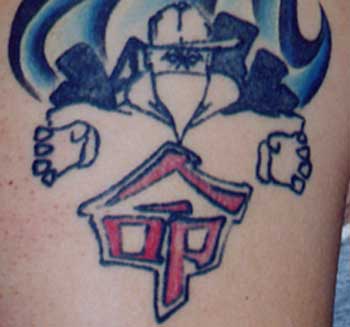Zigeunerweisen and non-sensical kanji tattoos
 Zigeunerweisen has to be very likely the most forgettable title of a Japanese film I have ever seen (ツィゴイネルワイゼン in Japanese). The title refers to a German musical piece played in the film, and although the piece is a part of the movie, it is an unfortunate title. This is one of Suzuki Seijun's Taisho Trilogy, and, I must say, I prefer it when Suzuki is trying to sneak in his visual brilliance under the radar of the studios, rather than being given the freedom to go out on his own. Long, drawn out and arty, Zigeunerweisen depends more on the Suzuki's too few stunning visuals than it does on it's paper-door thin plot. The theme of the movie is love triangles. And we see several different versions of the doomed scenerios, though most cleverly surmised in a side story of a blind homeless threesome who travel the land playing randy rhythmless songs for spare change. The young helper falls for the young wife of the old blind man, and stupidly flirt with each other with little reservation, leading up to a bizarre beachside showdown between the two blind men.
Zigeunerweisen has to be very likely the most forgettable title of a Japanese film I have ever seen (ツィゴイネルワイゼン in Japanese). The title refers to a German musical piece played in the film, and although the piece is a part of the movie, it is an unfortunate title. This is one of Suzuki Seijun's Taisho Trilogy, and, I must say, I prefer it when Suzuki is trying to sneak in his visual brilliance under the radar of the studios, rather than being given the freedom to go out on his own. Long, drawn out and arty, Zigeunerweisen depends more on the Suzuki's too few stunning visuals than it does on it's paper-door thin plot. The theme of the movie is love triangles. And we see several different versions of the doomed scenerios, though most cleverly surmised in a side story of a blind homeless threesome who travel the land playing randy rhythmless songs for spare change. The young helper falls for the young wife of the old blind man, and stupidly flirt with each other with little reservation, leading up to a bizarre beachside showdown between the two blind men.The movies also explores the time in Japan (1920s) when styles from Europe and the US slipped in hand-in-hand with the more traditional Japanese dress. I am happy Kino chose to release these titles in the US, but their menus are rather cheap-looking and the extras minimal. Criterion does such a much more professional looking job, I do hope they will continue bringing us more quality Seijun Suzuki films.
I had to include this article from Fox News. So often people are quick to point and laugh at meaningless English on Japanese t-shirts and handbags, but I have never seen a Japanese person with Engrish permanently inked on their arm, and there are plenty of Westerners who have gone that route.
She thought it said "blood and guts," but it really said "blood and
intestines." He thought it said "rock 'n' roll," but it really said "to sway and
to roll."
"That would be translating it literally, but nobody would actually use
those characters to say 'rock 'n' roll' in Chinese," [New York City jewelry designer Jane Ko] said. "In Chinese
people would ask, 'Why would you 'get the rolls?'"
Maria Robinson, a video
game designer in Oakland, Calif., who was born in China, has often seen people
with badly written tattoos that were supposed to be Chinese. In one case, the
Chinese text was actually upside-down.
For the non-tattooed, at least, the
results can be worth a good laugh. Ko recalled one instance in which a man
approached her with a tattoo on his forearm that he had always taken to be the
Chinese character for “spirit.”
“I was like, ‘Why did he have that tattoo?’”
she said. “It really said ‘gas’”


0 Comments:
Post a Comment
<< Home